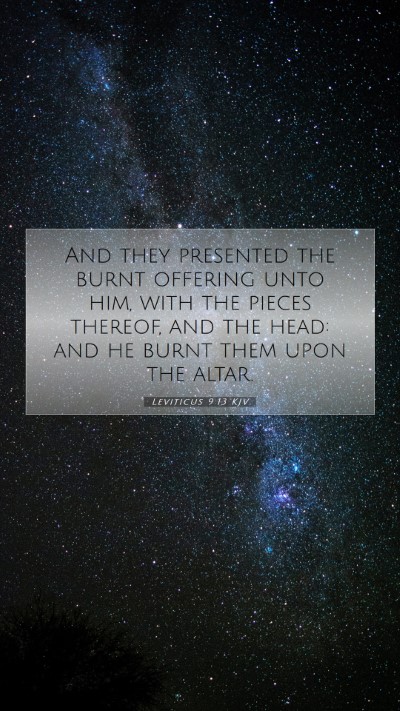Understanding Leviticus 9:13:
Leviticus 9:13 states, "And they presented the burnt offering to him, with the pieces thereof, and the head thereof; and he washed the inwards and the legs thereof, and burnt them upon the burnt offering on the altar." This verse reflects the detailed instructions for the offerings presented to God by the priests. The significance of these rituals transcends mere procedure; they encompass themes of holiness, obedience, and the relationship between God and His people.
Context and Importance:
The context of this passage lies within the establishment of the priesthood and the sacrificial system in ancient Israel. It is vital for understanding how the Israelites approached worship and maintained their covenant relationship with God. The meticulous nature of the sacrifices highlights the seriousness with which they observed God's commands.
Bible Verse Meanings:
- Obedience to God: The act of presenting the offerings as prescribed illustrates total obedience to God's commands, an essential element of biblical faith.
- Symbolism of Sacrifice: The burnt offering symbolizes atonement and dedication to God, emphasizing the importance of offering oneself fully in worship.
- Purification Process: The washing of the parts before burning them symbolizes purity and the necessary preparation to approach a holy God.
Insights from Public Domain Commentaries:
Matthew Henry notes that the burnt offering signifies the complete surrender to God. The act of washing represents the need for sanctity in service to God. He emphasizes that every detail in these offerings holds significance for the worshipper's heart and intent.
Albert Barnes adds that the presentation of the head and the parts of the burnt offering symbolize the dedication of the whole person to God. His commentary highlights how these rituals were intended to create a deeper connection between God and His people, reflecting their faith through tangible actions.
Adam Clarke points out that the burnt offerings were essential for maintaining the relationship with God and recognizing His holiness. He elaborates on the cultural context and the impact of these practices in ancient Israelite society, tracing the traditions that stem from these early biblical instructions.
Application and Reflection:
This verse invites believers to reflect on their personal worship practices. Just as the Israelites were called to present specific offerings, Christians are encouraged to bring their whole lives before God as living sacrifices (Romans 12:1). This understanding of sacrificial worship is crucial for deepening one’s faith and commitment to God.
Related Bible Cross References:
- Exodus 12:8 - Instructions on the Passover and its significance.
- Leviticus 1:3-9 - Details about the burnt offerings and their intended symbolism.
- Romans 12:1 - The call to present our bodies as living sacrifices as a spiritual act of worship.
- Hebrews 10:13-14 - The fulfillment of sacrifice in Christ, who offered Himself once for all.
- 1 Peter 2:5 - Believers are described as living stones being built into a spiritual house.
- 1 John 1:9 - The importance of confession and cleansing in our relationship with God.
- Matthew 5:23-24 - The significance of reconciliation before offering gifts to God.
In conclusion, Leviticus 9:13 functions as a reminder of the sacredness of worship and the importance of approaching God with reverence and purity. The deeper meanings behind these rituals speak to timeless truths about dedication, obedience, and the sanctity of the relationship between God and His followers.


